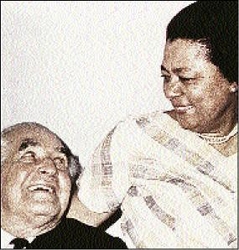
Sir Alexander Bustamante, who died in 1977, with Lady Bustamante, who died on July 25. - Photo by LMH Publishing Limited
On its website, the Latin monthly magazine Coloquio Revisita lists Jamaica's first prime minister Sir Alexander Bustamante among its 'Famous Hispanics'. Had he been alive, it's likely 'Busta' would find that tidbit amusing.
Today marks the 32nd anniversary of Bustamante's death. Jamaica's most flamboyant and unpredictable politician was 93 years old.
Many Internet postings have contrasting accounts of Bustamante's life, especially the early period. Busta, some historians believe, contributed to this mystery with his fabled yarns.
Different stories
For example, he was born William Alexander Clark in Blenheim, Hanover, in 1884 to a father of Irish descent and a black mother. It is reported that he took the surname Bustamante from an Iberian sea captain who adopted him, which may have led editors at Coloquio to believe he was of Hispanic heritage.
There are different stories about his travels abroad in the early 20th century. Some bios place him in Panama, Cuba and the United States, others in Costa Rica or Latin American countries where Jamaicans went to find work.
No darling
What cannot be discounted is Bustamante's standing in modern Caribbean history. He was a passionate labour leader who founded the Bustamante Industrial Trade Union and the Jamaica Labour Party and, along with his cousin Norman Washington Manley, helped pave the way for Jamaica's independence from Britain in August 1962.
Historian and Sunday Gleaner columnist, Kevin O'Brien Chang, believes because Bustamante has never been a darling of the intelligentsia, stories portraying him as a buffoon are still part of popular lore.
"The common man has always given him his due, but folk memory dies out," Chang said. "Books are the repository of memory, yet there are not many biographies on Busta or Norman Manley. That's where I think the intelligentsia have fallen down."
University of the West Indies professor George E. Eaton's Alexander Bustamante and Modern Jamaica is regarded in some quarters as the definitive Bustamante biography. First released in 1975, it was reissued 20 years later.
Patrick E. Bryan, a professor in the University of the West Indies' Faculty of Humanities and Educa-tion, disagrees that Bustamante has been cast as a simpleton by Jamaican academics.
"No one can doubt his political shrewdness," Bryan said.
However, he endorses Chang's observation that biographies of Jamaican statesmen are rare, although there is a proliferation of papers done by UWI stalwarts Rex Nettleford, Trevor Munroe and Rupert Lewis.
"The material is there, just no biographies," Bryan noted.
Never crossed line
In recent years, there has been an attempt to introduce Jamaica's founding fathers to Generation X. Rachel Manley, Manley's grand-daughter, has written personal recollections of growing up at Drumblair, the family home in St Andrew.
Journalist Hartley Neita wrote biographies on prime ministers Hugh Shearer and Donald Sangster, both of whom he served as press secretary.
If many remain in the dark as to Bustamante's greatest contribution, Chang is not.
"Jamaica has one of the most vibrant and stable democracies in the world, and we owe that to Busta and Norman. They never crossed the line," he said.